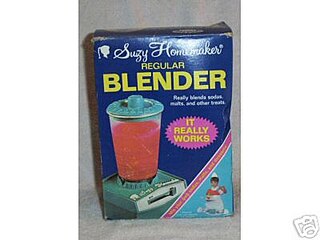Related Research Articles

Barbie is a fashion doll manufactured by American toy company Mattel, Inc. and launched on March 9, 1959. American businesswoman Ruth Handler is credited with the creation of the doll using a German doll called Bild Lilli as her inspiration.

An action figure is a poseable character model figure made most commonly of plastic, and often based upon characters from a film, comic book, military, video game or television program; fictional or historical. These figures are usually marketed toward boys and adult collectors. The term was coined by Hasbro in 1964 to market G.I. Joe to boys.

Bratz is an American fashion doll and media franchise created by former Mattel employee Carter Bryant for MGA Entertainment, which debuted in 2001.

Kawaii(Japanese: かわいい or 可愛い, IPA: [kawaiꜜi]; 'lovely', 'loveable', 'cute', or 'adorable') is the culture of cuteness in Japan. It can refer to items, humans and non-humans that are charming, vulnerable, shy and childlike. Examples include cute handwriting, certain genres of manga, anime, and characters including Hello Kitty and Pikachu from Pokémon.

Gebr. Märklin & Cie. GmbH or Märklin is a German toy company. The company was founded in 1859 and is based at Göppingen in Baden-Württemberg. Although it originally specialised in doll house accessories, today it is best known for model railways and technical toys. In some parts of Germany and in Sweden, the company's name is almost synonymous with model railways.
Rainbow Brite is a media franchise by Hallmark Cards, introduced in 1984. The animated Rainbow Brite television series first aired in 1984, the same year Hallmark licensed Rainbow Brite to Mattel for a range of dolls and other merchandise. A theatrical feature-length film, Rainbow Brite and the Star Stealer, was released by Warner Bros. in 1985. The franchise was rebooted in 2014 with a three part mini-series released on Hallmark's online streaming video service, Feeln. A line of new merchandise by Hallmark online and in its shops debuted in 2015.

Polly Pocket is a toy line of dolls and accessories first founded and designed by Chris Wiggs in 1983 and licensed by Bluebird Toys from 1989 until both entities/properties were acquired by Mattel in 1998.
American Girl is an American line of 18-inch (46 cm) dolls released on May 5, 1986, by Pleasant Company. The dolls portray eight- to fourteen-year-old boys and girls of various ethnicities, faiths, and social classes from different time periods throughout history. They are sold with accompanying books told from the viewpoint of the girls. Originally the stories focused on various periods of American history, but were expanded to include characters and stories from contemporary life. Aside from the original American Girl dolls, buyers also have the option to purchase dolls that look like themselves. The options for the line of Truly Me dolls include eye color, face mold, skin color, hair texture, and hair length. A variety of related clothing and accessories is also available. A service for ordering a custom-made doll with features and clothing specified by the owner dubbed Create Your Own, has also been introduced in 2017.

Fashion dolls are dolls primarily designed to be dressed to reflect fashion trends. They are manufactured both as toys for children to play with and as collectibles for adults. The dolls are usually modeled after teen girls or adult women, though child, male, and even some non-human variants exist. Contemporary fashion dolls are typically made of vinyl or another plastic.

What's Her Face was a line of customizable dolls that straddled the line between traditional fashion dolls and creative activity toys. Made by Mattel, the line ran from 2001–2003, and enjoyed only a modest success in a market dominated by Mattel's iconic Barbie and MGA Entertainment's Bratz dolls. Following the discontinuation of the What's Her Face line, their body molds were used for the Wee 3 Friends line of Barbie-related dolls. Several fashion, wig, and activity packs were also released for the What's Her Face line.

Licca-chan is a Japanese fashion doll launched on July 4, 1967 by Takara, enjoying the same kind of popularity in Japan as the Barbie series does in the United States. Takara had sold over 48 million Licca-chan dolls as of 2002, and over 53 million as of 2007. Licca-chan was created by former shōjo manga artist, Miyako Maki.

MGA Entertainment Inc. is a manufacturer of children's toys and entertainment products founded in 1979. Its products include Bratz, L.O.L. Surprise!, Num Noms, and Rainbow High. MGA also owns Little Tikes and animation studio MGA Studios.
Fulla is the name of an 11.5 in (290 mm) Barbie-like fashion doll marketed to children of Islamic and Middle-Eastern countries as an alternative to Barbie. The product's concept evolved around 1999, and it became available for sale in late 2003. Fulla was created by a Syrian manufacturer from Syria called NewBoy FZCO. In 2015 the company moved to the United Arab Emirates and is now located in Dubai. Fulla is also sold in China, in Brazil, North Africa, Egypt, and Indonesia, while a few are sold in the United States. Although there had been many other dolls in the past that were created with a hijab, such as Razanne and Moroccan Barbie, Fulla surpassed them in popularity due to launching alongside a marketing campaign aired on the then-popular television channel Spacetoon. Fulla is a role-model to some Muslim people, displaying how many Muslim parents would prefer their daughters to dress and behave.

Sindy is a British fashion doll created by Pedigree Dolls & Toys in 1963. A rival to Barbie, Sindy's wholesome look and range of fashions and accessories made her the best-selling toy in the United Kingdom in 1968 and 1970. After Marx Toys' unsuccessful attempt to introduce Sindy in the United States in the late 1970s, Hasbro bought the rights to Sindy and remodelled the doll to look more American. As a result, the doll's popularity declined; in addition Barbie manufacturer Mattel filed a lawsuit for copyright infringement, which was settled when Hasbro agreed to remodel Sindy's face. During the 1990s, Barbie's share of the doll market continued to grow while Sindy's diminished, which led to Sindy being delisted from major retailers in 1997. Hasbro returned the doll's licence to Pedigree, and the doll was relaunched in 1999, manufactured by Vivid Imaginations. Sindy's 40th anniversary in 2003 saw a new manufacturer, New Moons, and another relaunch and redesign.
Diva Starz was a series of talking fashion dolls created and released by Mattel in October 2000. They are similar in design to MGA's Bratz and Tiger Electronics' Furby. Alexa, Nikki, Summer—later replaced by Miranda—and Tia were offered in the original debut. Originally produced as robotic dolls, Mattel would also release miniature and fashion doll versions in response to their initial success. The line was discontinued in 2004.

Fisher-Price is an American company that produces educational toys for infants, toddlers and preschoolers, headquartered in East Aurora, New York. The company was founded in 1930 during the Great Depression by Herman Fisher, Irving Price, Helen Schelle, and Margaret Evans-Price.

NewBoy FZCO is a family-owned company based in Dubai, UAE, and the exclusive owner of the famous doll brand Fulla. Fulla is thought to be the best-selling toy in the girls doll category throughout the Arab world. Fulla is the cultural adaptation of family values as reflected within the cultural norms throughout the region.

Girls' toys and games are toys and games specifically targeted at girls by the toy industry. They may be traditionally associated either exclusively or primarily with girls by adults and used by girls as an expression of identity. One commentator have argued that the market for girl's toys and games is more challenging than that for boys' toys and games.

Suzy Homemaker was a line of miniature functional toy household appliances produced by Topper Toys and launched in 1966. Topper Toys created a line of accessory toys to be bought separately, which included items such as a small working oven, a vacuum cleaner, and several other items in addition to a Suzy Homemaker doll introduced later. The term "Suzy Homemaker" has since become a common phrase in American English.
Integrity Toys is a toy company that designs and markets fashion and celebrity dolls and related accessories, with a focus on high-end fashion dolls. Integrity Toys was founded in 1995 by Percy Newsum. Integrity Toys is a privately held company located at 100 Chestnut Springs Road in Chesapeake City, Maryland.
References
- ↑ "Market for Middle East contact brings useful lessons - report from the Middle East Toy Fair 2006, Dubai (tdctrade.com)". Archived from the original on 2007-09-11. Retrieved 2008-02-06.
- ↑ "Market News: Middle East: Baby and Toy Edition: December 2007 -- p. 8, New on the Market: Jamila" (PDF). Archived from the original (PDF) on 2008-09-08. Retrieved 2008-02-06.